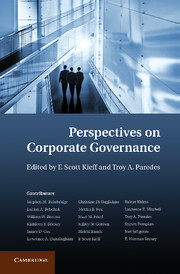Book contents
- Frontmatter
- Contents
- Contributors
- Acknowledgments and Dedication
- PERSPECTIVES ON CORPORATE GOVERNANCE
- Introduction
- PART ONE THE BOARD OF DIRECTORS AND THE CEO
- PART TWO THE WHY, WHEN, HOW, AND HOW MUCH OF EXECUTIVE PAY
- PART THREE CONSTRAINING MANAGERS AND DIRECTORS: INVESTORS, SECURITIES REGULATION, AND THE MEDIA
- PART FOUR DELAWARE VERSUS CONGRESS: ON THE FEDERALIZATION OF CORPORATE GOVERNANCE
- 10 How Delaware Law Can Support Better Corporate Governance
- 11 Federalism versus Federalization: Preserving the Division of Responsibility in Corporation Law
- PART FIVE COMPARATIVE CORPORATE GOVERNANCE
- Epilogue: Three Secular Trends of Corporate Law
- Index
- References
10 - How Delaware Law Can Support Better Corporate Governance
Published online by Cambridge University Press: 04 August 2010
- Frontmatter
- Contents
- Contributors
- Acknowledgments and Dedication
- PERSPECTIVES ON CORPORATE GOVERNANCE
- Introduction
- PART ONE THE BOARD OF DIRECTORS AND THE CEO
- PART TWO THE WHY, WHEN, HOW, AND HOW MUCH OF EXECUTIVE PAY
- PART THREE CONSTRAINING MANAGERS AND DIRECTORS: INVESTORS, SECURITIES REGULATION, AND THE MEDIA
- PART FOUR DELAWARE VERSUS CONGRESS: ON THE FEDERALIZATION OF CORPORATE GOVERNANCE
- 10 How Delaware Law Can Support Better Corporate Governance
- 11 Federalism versus Federalization: Preserving the Division of Responsibility in Corporation Law
- PART FIVE COMPARATIVE CORPORATE GOVERNANCE
- Epilogue: Three Secular Trends of Corporate Law
- Index
- References
Summary
Corporate governance, or more particularly, improving corporate governance, has been an important national topic for decades – indeed from the first appearance of the public corporation. Within this discourse, we frequently find that the public and academics alike have short memories. We too frequently focus on the present more than on the sweep of history. So it is with the present corporate governance discussions. We tend to begin with the collapse of Enron in late 2001 and focus on the most recent tinkering with governance, such as the New York Stock Exchange's (NYSE) and Nasdaq's listing requirements and the novel, albeit discrete, federal incursion into the domain of corporate governance with the passage of the Sarbanes-Oxley Act. But corporate governance has a much longer history, and it is instructive to identify the forces that support the evolution of governance practices. For example, forty years ago, we were debating whether there should be a critical mass of independent directors on public company boards; critical mass was thought to be a distinct minority of two or three, and audit committees were just barely being discussed as a governance tool. Within a decade, each of these practices became common not because of listing requirements but because of the development of best practices. The efficiencies inherent with independent voices on the board and assigning recurring tasks – compensation, interaction with the auditors, and nominating new board members – to specialized committees led to the modern board structure.
- Type
- Chapter
- Information
- Perspectives on Corporate Governance , pp. 335 - 350Publisher: Cambridge University PressPrint publication year: 2010



